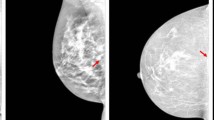Abstract
Deep learning-based segmentation has emerged as a powerful and effective technique for addressing diverse medical imaging tasks. Particularly, in mammography image analysis, segmenting the anatomical structures plays a significant role in computer-aided diagnosis assistance and positioning assessment. However, accurately identifying the pectoral muscle in the craniocaudal view presents challenges even for experienced radiologists due to its variable size, potential absence, and fibroglandular tissue overlaps. These challenges are further amplified when dealing with error-prone annotations, where mislabeled or inaccurately labeled data can lead to training the model on incorrect information. Consequently, this can cause the model to learn from these errors and produce underperforming or suboptimal results during inference. To address this, we propose a two-stage data-centric approach to enhance the accuracy of the deep-learning-based mammography segmentation model. In the first stage, we introduce a shape-based label analysis to automatically identify pectoral muscle labels with possible inconsistencies for a posterior manual review and correction. Then, in the second stage, we downsample the training dataset by removing outlier images with dubious annotations. The experimental results show the effectiveness of prioritizing training data quality and reliability. This approach significantly improved the model’s ability to detect and accurately segment the pectoral muscle.
Access this chapter
Tax calculation will be finalised at checkout
Purchases are for personal use only
Similar content being viewed by others
References
Bick, U., Diekmann, F.: Digital mammography: what do we and what don’t we know? Eur. Radiol. 17, 1931–1942 (2007)
Bou, A.: Deep learning models for semantic segmentation of mammography screenings (2019)
Camilus, K.S., Govindan, V., Sathidevi, P.: Pectoral muscle identification in mammograms. J. Appl. Clin. Med. Phys. 12(3), 215–230 (2011)
Dubrovina, A., Kisilev, P., Ginsburg, B., Hashoul, S., Kimmel, R.: Computational mammography using deep neural networks. Comput. Meth. Biomech. Biomed. Eng. Imaging Visual. 6(3), 243–247 (2018)
Ge, M., Mainprize, J.G., Mawdsley, G.E., Yaffe, M.J.: Segmenting pectoralis muscle on digital mammograms by a Markov random field-maximum a posteriori model. J. Med. Imaging 1(3), 034503–034503 (2014)
Guo, Y., Zhao, W., Li, S., Zhang, Y., Lu, Y.: Automatic segmentation of the pectoral muscle based on boundary identification and shape prediction. Phys. Med. Biol. 65(4), 045016 (2020)
Lin, T.Y., Dollár, P., Girshick, R., He, K., Hariharan, B., Belongie, S.: Feature pyramid networks for object detection. In: Proceedings of the IEEE Conference on Computer Vision and Pattern Recognition, pp. 2117–2125 (2017)
Rubio, Y., Montiel, O.: Multicriteria evaluation of deep neural networks for semantic segmentation of mammographies. Axioms 10(3), 180 (2021)
Sierra-Franco, C.A., Hurtado, J., Thomaz, V.D.A., da Cruz, L.C., Silva, S.V., Raposo, A.B.: Towards automated semantic segmentation in mammography images (2023)
Tan, M., Le, Q.: EfficientNet: rethinking model scaling for convolutional neural networks. In: International Conference on Machine Learning, pp. 6105–6114. PMLR (2019)
Zuiderveld, K.: Contrast Limited Adaptive Histogram Equalization, pp. 474–485. Academic Press Professional Inc, USA (1994)
Author information
Authors and Affiliations
Corresponding author
Editor information
Editors and Affiliations
Rights and permissions
Copyright information
© 2023 The Author(s), under exclusive license to Springer Nature Switzerland AG
About this paper
Cite this paper
Silva, S.V. et al. (2023). A Data-Centric Approach for Pectoral Muscle Deep Learning Segmentation Enhancements in Mammography Images. In: Bebis, G., et al. Advances in Visual Computing. ISVC 2023. Lecture Notes in Computer Science, vol 14361. Springer, Cham. https://doi.org/10.1007/978-3-031-47969-4_5
Download citation
DOI: https://doi.org/10.1007/978-3-031-47969-4_5
Published:
Publisher Name: Springer, Cham
Print ISBN: 978-3-031-47968-7
Online ISBN: 978-3-031-47969-4
eBook Packages: Computer ScienceComputer Science (R0)




